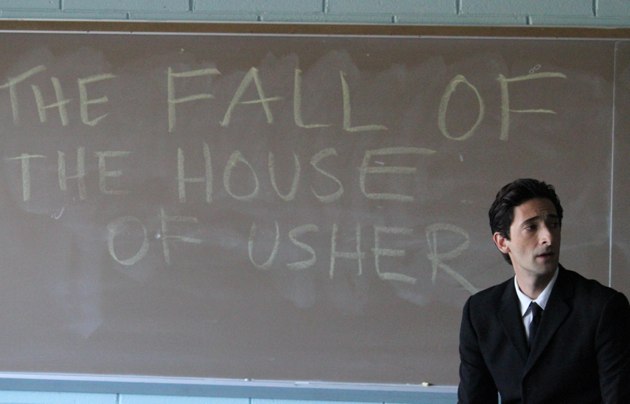Adrien Brody on His Tribeca Premiere Detachment, the Genius of Tony Kaye, and That Stella Artois Ad
You've obviously worked with some pretty visionary filmmakers, from Terrence Malick to Roman Polanski to Spike Lee. Where does Tony Kaye fall on that spectrum, at least in terms of the actor/director relationship?
Tony is extremely collaborative. He's also -- and I don't use the term lightly -- a creative genius. I think he has a unique ability to make the most of any situation. With independent filmmaking you have very limited resources and time, and it's a tremendous accomplishment filming the movie Tony has filmed in New York City under the budget restrictions we had. Tony also [camera] operates, so he's a D.P. as well. There's a greater intimacy and connection with the filmmaker when he and the protagonist are... I mean, it's a dance -- the art of capturing that and lighting that. Sometimes you have a wonderful D.P. come in and create a visual scape that's really beautiful. But obviously there's a disconnect between the filmmaker and the performer -- what the director wants to capture in a given moment. Tony is relatively specific in what he's looking for, and he can just jump in and capture that. You, as a performer, really feel that presence and enthusiasm rather than the director sitting in another room watching on a monitor. You know what I mean?
Of course. Yet perhaps in part due to methods like that, he's also mythologized as difficult and intense and an unwavering perfectionist -- not always in a good way. Is any of that fair? And are any of those accurate attributes that actually work in his favor?
I think there's a relatively negative stigma attached to the way that is depicted, don't you agree?
Yes.
An "unwavering perfectionist" is an asset in many ways -- and I would agree that there is this relentless desire within him to create the most beautiful and truthful creative approach to his storytelling. Sometimes things aren't achievable given time frames or the loss of light or whatever, but Tony always finds a way to make it work. And that is something that's a tremendous asset to any production. You know? He's an artist! Artists are creative and not entirely predictable, and you have to embrace that quality, I think. I can't speak of his other experiences because I wasn't there. But I can speak of my experiences and my respect for him and admiration for him as a pure creative spirit and someone who wants only the best for his production and what he wants to share with the audience. That is rare. I've been fortunate; I've worked with a lot of creative geniuses, and every one of them has their individual strengths they bring to the table. I think what Tony brings is phenomenal and very encouraging also for me and my process. This was a labor of love for all of us. That kind of passion goes a long way.
You've been working a lot, but some of these recent films get detoured or held up or whatever. How frustrating is it when films like The Experiment or Wrecked get lost in the distribution shuffle?
I think it speaks more about our economy or the nature of the business or the complexity of the distribution market -- how that works, what is perceived to be viable. There is definitely a shift in the industry and the approach to how to distribute smaller, artistic films such as Wrecked. All of that stuff is beyond my control. You always have to hope for the best and be thankful for the opportunities to do work that is inspiring and hope people see it. I mean, I think the one advantage of a digital release platform is that so many people tend to see those movies. Do I feel like that is the best way to view a film that is made on film for a cinematic experience? Not necessarily. But do small films have the marketing budget to get audiences into a theater, even if they have the theatrical? No.
It's a very competitive marketplace, and it's an unfortunate reality of the business -- the state of the business -- currently. It doesn't make me want to make films that are destined for a more commercial future, but it does sadden me that films that have been made for the right reasons don't necessarily get the level of support that certain films made just to be commercially viable do. There are other complexities I can't get into about The Experiment that really had nothing to do with the film, unfortunately. But... No regrets.
Finally, I wanted to ask you about your Stella Artois commercial that premiered during the Super Bowl. What was the story behind that?
That was something I was going to do with a friend of mine, who's a director I admire a lot. Eventually the story shifted, but I ended up doing it. But the story was to step into the shoes of a kind of [Serge] Gainsbourg-esque character. And I love that era, I love the music, I love that laissez-faire, free-spirited nature of that time. It was a character -- and it was wonderful to get the opportunity to play a character like that. I never had the courage to sing before, and I sang it -- in front of 50 million people -- so it was actually a very creative endeavor for me. We shot in the UK in an old stone cellar. It was a filmmaking experience. Ringan Ledwidge was the director -- a wonderful guy. We had a great time making it. I wish there were more creative endeavors like that.
I thought I was the only one who got that romantically attached to my beer.
Many people share that, I'm sure.
[Top photo: FilmMagic]
Pages: 1 2

